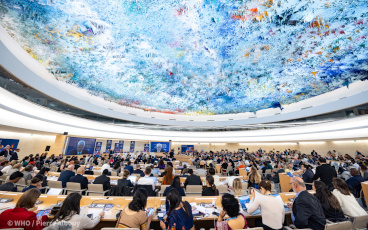Polio eradication staff mobilized to support Pakistan flood relief
Health system could take years to recover following flood damage “beyond imagination” – polio strategies adapted to protect polio-free areas of the country

Polio eradication staff and resources have been mobilized en masse to support the response to the devastating floods directly affecting one in 10 people in Pakistan. All polio-funded technical staff – polio epidemiologists and surveillance officers – have relocated to the worst-affected areas of the country to assist in the recovery. These staff are focused on three main areas: a rapid assessment of the extent of damage to health facilities; the establishment of early warning systems for disease outbreaks; and, the planning, delivery and monitoring of broad immunization activities in internally-displaced persons camps.
Pakistan polio team leader Dr Ni’ma Abid said the extent of the flood damage was “really beyond imagination” and had had an enormous impact on health systems in the country. He said the immunization cold chain system had been severely affected, and would take “a long time” to be rehabilitated. While controlling outbreaks of disease and conducting immunizations were a necessary focus, “the priority is still for food and shelter more than anything else”. Dr Abid said that within the health industry, a “significant number of health workers are affected, their houses are affected – it’s very difficult, a very big challenge”.
Currently, the Ministry of Health’s strategy is to vaccinate all displaced children under 5 years with measles vaccine and oral polio vaccine (OPV), and to distribute Vitamin A. Other routine antigens have been distributed, but not in all camps. In the areas of Khyber Pakhtunkhwa (previously known as North West Frontier Province) where flood waters have receded – Peshawar, Charsada, Dir Lower and Swat – mass campaigns administering measles vaccine, OPV and Vitamin A have been conducted in all affected Union Council administrative areas. To date, 340,081 children have been immunized with OPV in flood-affected areas, 316,540 with measles and 255,920 have received Vitamin A. BCG, pentavalent, TT and Hepatitis B have also been given.
Recognizing the potential for spread of disease, the Ministry of Health has put in place a plan to vaccinate children in all flood-affected districts with measles vaccine and OPV in three phases: the 1st phase will commence in September, targeting 7.28 million children in the 40 worst-affected districts; continuing with moderately affected districts in October and finally, non-affected districts in early 2011.
The UN has launched a flash appeal for the flood relief effort, and as part of this, funds would go to support emergency measles/polio campaigns. The global polio eradication network is uniquely equipped with both international and national professional staff, allowing for immediate support to emergency response. The network is able to provide rapid assessment and early logistical and operational support. With local knowledge of communities, health systems and government structures, the polio network’s technical capacity in disease surveillance and planning of large-scale operations is often at the forefront of international and national relief efforts.













